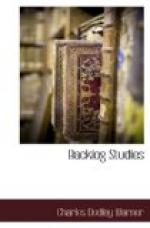It is time to punch the backlog and put on a new forestick.
SECOND STUDY
I
The log was white birch. The beautiful satin bark at once kindled into a soft, pure, but brilliant flame, something like that of naphtha. There is no other wood flame so rich, and it leaps up in a joyous, spiritual way, as if glad to burn for the sake of burning. Burning like a clear oil, it has none of the heaviness and fatness of the pine and the balsam. Woodsmen are at a loss to account for its intense and yet chaste flame, since the bark has no oily appearance. The heat from it is fierce, and the light dazzling. It flares up eagerly like young love, and then dies away; the wood does not keep up the promise of the bark. The woodsmen, it is proper to say, have not considered it in its relation to young love. In the remote settlements the pine-knot is still the torch of courtship; it endures to sit up by. The birch-bark has alliances with the world of sentiment and of letters. The most poetical reputation of the North American Indian floats in a canoe made of it; his picture-writing was inscribed on it. It is the paper that nature furnishes for lovers in the wilderness, who are enabled to convey a delicate sentiment by its use, which is expressed neither in their ideas nor chirography. It is inadequate for legal parchment, but does very well for deeds of love, which are not meant usually to give a perfect title. With care, it may be split into sheets as thin as the Chinese paper. It is so beautiful to handle that it is a pity civilization cannot make more use of it. But fancy articles manufactured from it are very much like all ornamental work made of nature’s perishable seeds, leaves, cones, and dry twigs,—exquisite while the pretty fingers are fashioning it, but soon growing shabby and cheap to the eye. And yet there is a pathos in “dried things,” whether they are displayed as ornaments in some secluded home, or hidden religiously in bureau drawers where profane eyes cannot see how white ties are growing yellow and ink is fading from treasured letters, amid a faint and discouraging perfume of ancient rose-leaves.
The birch log holds out very well while it is green, but has not substance enough for a backlog when dry. Seasoning green timber or men is always an experiment. A man may do very well in a simple, let us say, country or backwoods line of life, who would come to nothing in a more complicated civilization. City life is a severe trial. One man is struck with a dry-rot; another develops season-cracks; another shrinks and swells with every change of circumstance. Prosperity is said to be more trying than adversity, a theory which most people are willing to accept without trial; but few men stand the drying out of the natural sap of their greenness in the artificial heat of city life. This, be it noticed, is nothing against the drying and seasoning process; character must be put into the crucible some time, and why not in this world? A man who cannot stand seasoning will not have a high market value in any part of the universe. It is creditable to the race, that so many men and women bravely jump into the furnace of prosperity and expose themselves to the drying influences of city life.




